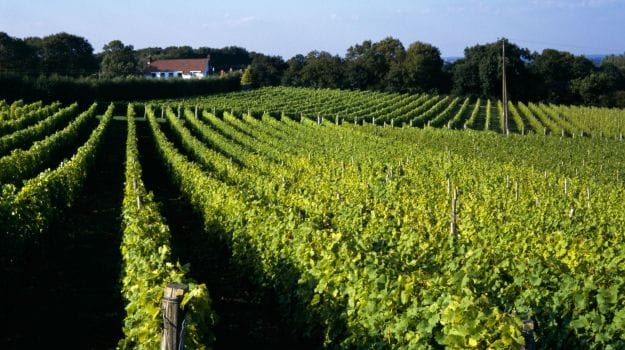English wine is growing in reputation – particularly its increasingly award-winning sparkling wines. Photograph: AlamyUK fizz has won 10 international gold medals this year alone and the world is starting to take noticeThose who still regard English wine as a bit of a joke (mainly the French) are going to have to eat their hat Paddy Ashdown-style after this set of figures. Not only has 2014 been a record harvest but producers have picked up 10 gold medals in the International Wine Challenge this year compared with five last year.
All of these are for sparkling wines, which is really what all the fuss is about. The soil and climatic conditions in southern England are remarkably similar to those of the Champagne region. Only the fact that the vines are much younger prevents them reaching champagne’s level of complexity – but they’re getting there. At this year’s English Wine Producers tasting I was struck (as I am every year) at just how much English fizz has improved, particularly from the very good 2010 vintage, which is many producers’ current release.
One producer, Colette O’Leary of Bluebell vineyards in East Sussex, which picked up a gold medal for its 2010 Hindleap Blanc de Blancs, said: “People are getting to grips now with how to make wine in England. And we’ve got to a stage where we can keep wine longer before releasing it.” Like many of the new generation of English winemakers, she trained at the wine faculty at nearby Plumpton College, which is turning out graduates who understand how to get the best from their local terroir.
The industry has also seen an influx of newcomers such as Court Garden, Wiston, and Henners, which are happy to remain small, concentrating on quality rather than volume. “We deliberately keep yields low by using a gentle press that results in much fresher, purer flavours,” says Ben Murray of Henners, another Plumpton graduate.
People moan that English wines are no cheaper than champagne but vineyards are expensive to operate and many producers are only just now breaking even. Former City investment analyst Ian Kellett, who heads up Hambledon vineyard in Hampshire, estimates it costs at least £125,000 a hectare (£50,000 an acre) for the first three years before you see a single harvestable grape. And that’s without building your own winery.
So why would anyone do it? “Because it’s a growing market. English sparkling wine only accounts for 1% to 0.5% of the UK sparkling wine market and with champagne constantly increasing in price there’s a growing gap in the £20-£30 price bracket. We aim to fill that.”
By contrast, English still wines – which are subject to more vintage variation and don’t have the benefit of an added dosage (the sugar solution added at bottling) – still have more of a case to prove. I don’t think Bacchus is going to entice sauvignon blanc lovers away from New Zealand any time soon. But consumers, particularly in the south of England, are getting used to having a local vineyard nearby just as they have a local brewery – and more and more are clearly inclined to patronise them.
•Fiona Beckett runs Matchingfoodandwine.com and writes about food and wine for the Guardian.










